When content and search engine optimization (SEO) converge, they can give you a big advantage…
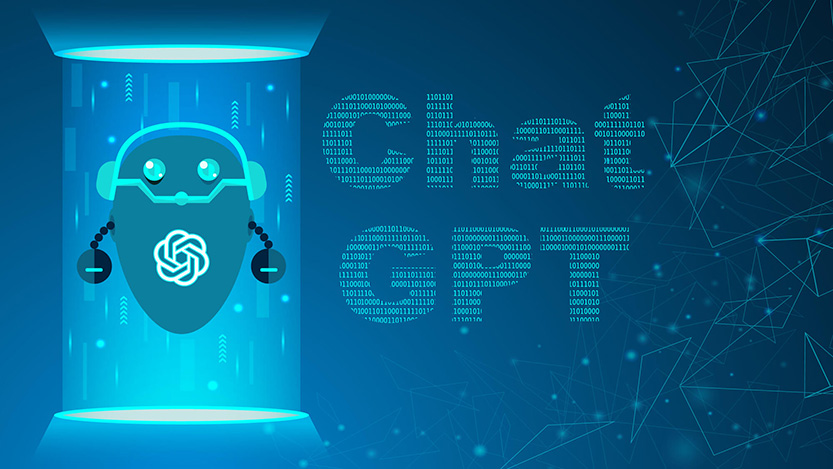
December 20, 2022 | Mindy Weinstein | SEO |
What is the Impact of ChatGPT for SEO & Content Marketing Strategies?
Short Answer
Before getting into the details about ChatGPT and artificial intelligence (AI), in general, let’s get straight to the questions most people have related to search marketing.
How will ChatGPT impact SEO? ChatGPT will make it easier to complete mundane and routine tasks associated with search engine optimization (SEO), such as organizing topics and keywords, determining frequently asked questions, sorting data and creating meta descriptions. What ChatGPT cannot yet do for SEO is create strategy, which requires human intervention.
How will ChatGPT impact content marketing? ChatGPT can assist in initial digital marketing research, content outlines and even topic ideas. However, ChatGPT relies on data up to 2021 and while the data sources have been closely guarded, OpenAI stated it generally crawled the web, used archived books and Wikipedia. ChatGPT has the ability to write content and as you will see in the examples ahead, the content is impressive. Yet, it does lack the personal and empathetic feel.
Long Answer
In 2019, I attended the inaugural Marketing AI Institute conference and what I learned during those few days opened my eyes to exactly how artificial intelligence (AI) can support our work.
While I have been impressed with ChatGPT, I am not surprised we now have this technology. It was simply a matter of time.
There has been a lot of discussion about ChatGPT and what it means for the future of SEO and content marketing. Before getting into the details of ChatGPT’s impact on search, let’s first get into what this technology actually does.
What Is Machine Learning?
AI encompasses various technologies used to solve problems through the use of machine learning algorithms. Machine learning, which falls under the umbrella of AI, can be further broken down into three categories: supervised learning, unsupervised learning, and reinforcement learning.
Supervised learning involves using labeled data to help a machine learn statistical patterns. Unsupervised learning occurs when the machine is asked to find patterns in unlabeled data without knowing the correct answer. Reinforcement learning involves identifying outcomes and determining which answers are better than others. ChatGPT uses reinforcement learning and a large language model.
Here is the explanation of “large language models” provided by ChatGPT.
These large language models are trained on vast amounts of text data in order to generate human-like responses and perform various language tasks. These models are typically trained using a technique called unsupervised learning, which means they are not provided with specific labels or answers, but instead are able to learn patterns and relationships in the data on their own.
One of the main benefits of large language models is their ability to generate highly coherent and fluent responses to prompts. This is achieved through the use of deep neural networks, which are able to capture the intricate relationships between different words and phrases in a sentence. This makes them especially useful for tasks such as translation, summarization, and question answering.
But What Exactly is ChatGPT?
To explain, and demonstrate ChatGPT, I went straight to the software and queried “write an original essay about ChatGPT.” Here is the result.
ChatGPT is a type of conversational language model developed by OpenAI. It is designed to generate human-like responses to prompts in a conversation, and can be trained on a wide range of topics and languages.
One of the main benefits of ChatGPT is its ability to generate coherent and fluent responses to prompts. This is achieved through the use of a transformer-based architecture, which allows the model to understand the context and relationships between different words and phrases in a conversation.
In addition to generating responses, ChatGPT is also able to perform various language tasks such as translation, summarization, and question answering. This makes it a versatile tool for tasks such as customer service, language translation, and content creation.
However, like all language models, ChatGPT has its limitations. While it can generate human-like responses, it lacks the ability to understand or interpret the meaning behind words and phrases. This can lead to humorous or nonsensical responses when the model is prompted with unexpected or unfamiliar input.
Overall, ChatGPT is a powerful tool for generating human-like responses in conversation and performing various language tasks. While it has its limitations, it has the potential to revolutionize the way we interact with machines and make tasks such as customer service and content creation more efficient.
Not bad.
Note that the AI at the center of ChatGPT is not new. It is a version of an AI model called GPT-3 (Generative Pre-trained Transformer 3) that produces text based on patterns it processed from massive quantities of text gathered from the web.
Will ChatGPT Replace Search Engines?
Whether ChatGPT will replace Google or other search engines is yet to be known. What we do know about new technology is that the adoption can be slow. This can be best described through the technology acceptance theory (TAT), which is a psychological model that explains how individuals evaluate and adopt new technologies. In the context of artificial intelligence, TAT can be used to understand how individuals may evaluate and adopt AI-powered products or services. For example, a person’s attitude towards using ChatGPT may be influenced by their perception of its ability to understand and respond to their needs and their perception of how easy it is to use.
Brian Nowak, an analyst at Morgan Stanley, recently commented that despite the threat of emerging services such as ChatGPT, Google continues to dominate the industry due to its large user base in the billions.
Morgan Stanley acknowledged the potential for natural language search models, like ChatGPT, to attract users who might otherwise use Google for information. However, it was pointed out that Google remains a major player in the industry, serving as the main point of entry for many internet users. Google continues to see a high number of daily users, with an estimated 4 billion users and billions of search queries being answered. In comparison, ChatGPT which gained 1 million users in its first week of operation. According to Morgan Stanley, for a new service to be successful in disrupting an established one, it must offer solutions that are ten times better. At this point, ChatGPT has not yet reached this level of superiority.
What Does ChatGPT Mean for SEO & Content Marketing?
Regardless of whether ChatGPT will replace search engines one day, what we do know is that it can take on routine tasks today freeing up our time to focus on more strategic work. In that aspect, ChatGPT is an asset to SEO and content marketing.
Let’s take a look at some practical applications identified so far.
SEO Application
There are many useful SEO applications with ChatGPT, such as:
- Performing initial keyword research
- Creating meta descriptions
- Detecting correlations
- Clustering keywords into topics
- Identifying anomalies
Let’s look at a couple of use cases.
Here is an example of ChatGPT generating keywords related to “digital marketing:”
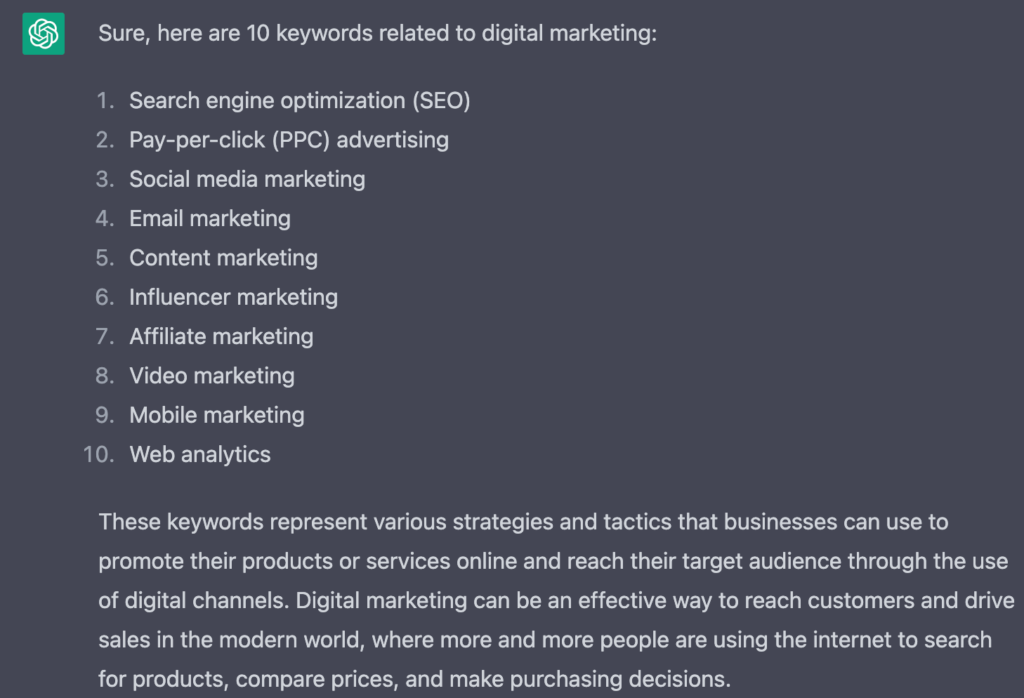
This type of list could help with brainstorming keywords, before using SEO software, such as SEMRush, Ahrefs, Moz, etc.
I then asked ChatGPT to create page titles for “search engine optimization:”
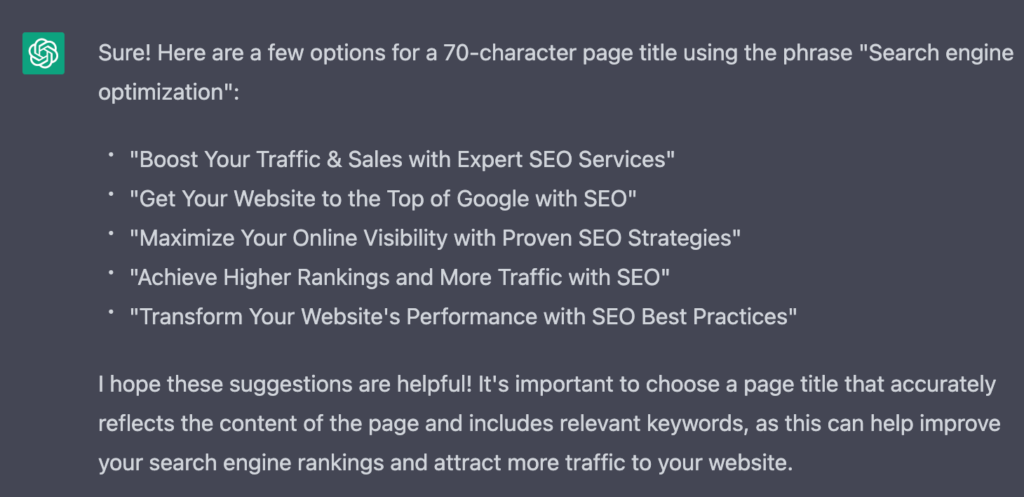
While these page titles were okay, they could certainly be optimized better. Again, the output could act as a good start or as a way to brainstorm title ideas.
Content Application
From a content perspective, ChatGPT can assist in the following:
- Conducting initial research
- Creating content outlines
- Generating topic ideas
- Developing headlines
Below is an example of topic ideas about search engine optimization. These topics have been written about quite often and are not unique. However, the list can act as a starting point in generating ideas.
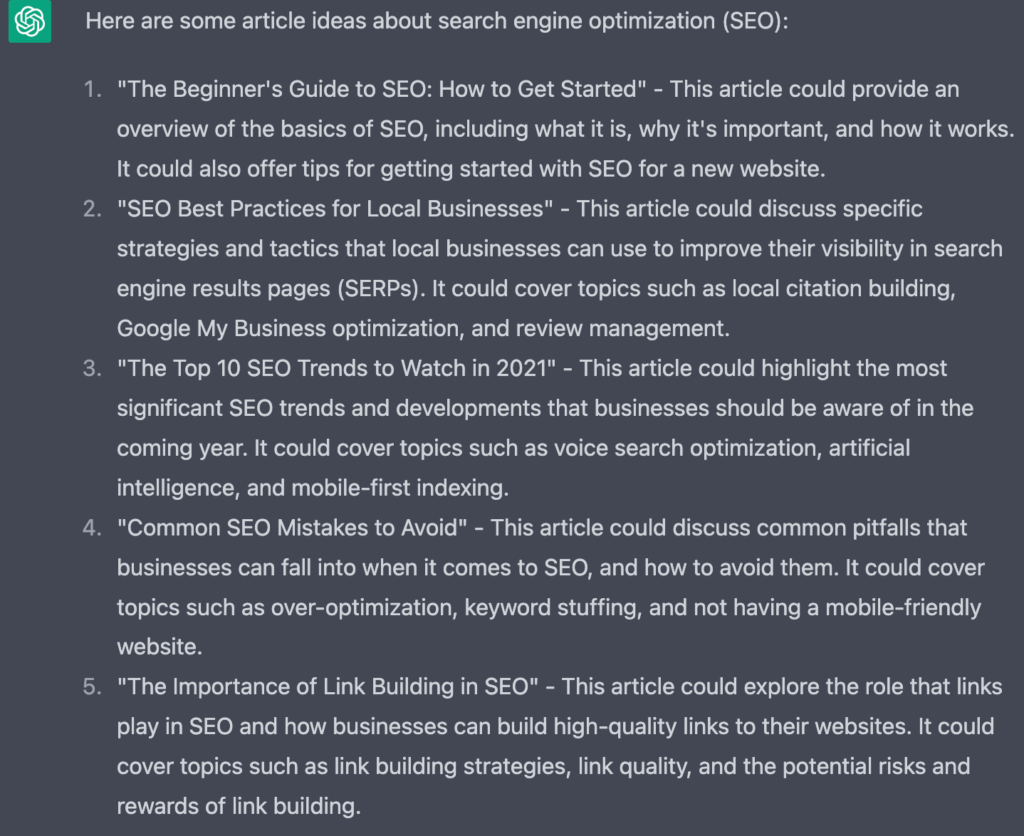
ChatGPT did prove useful in creating a content outline, though, as seen in the following screenshot.
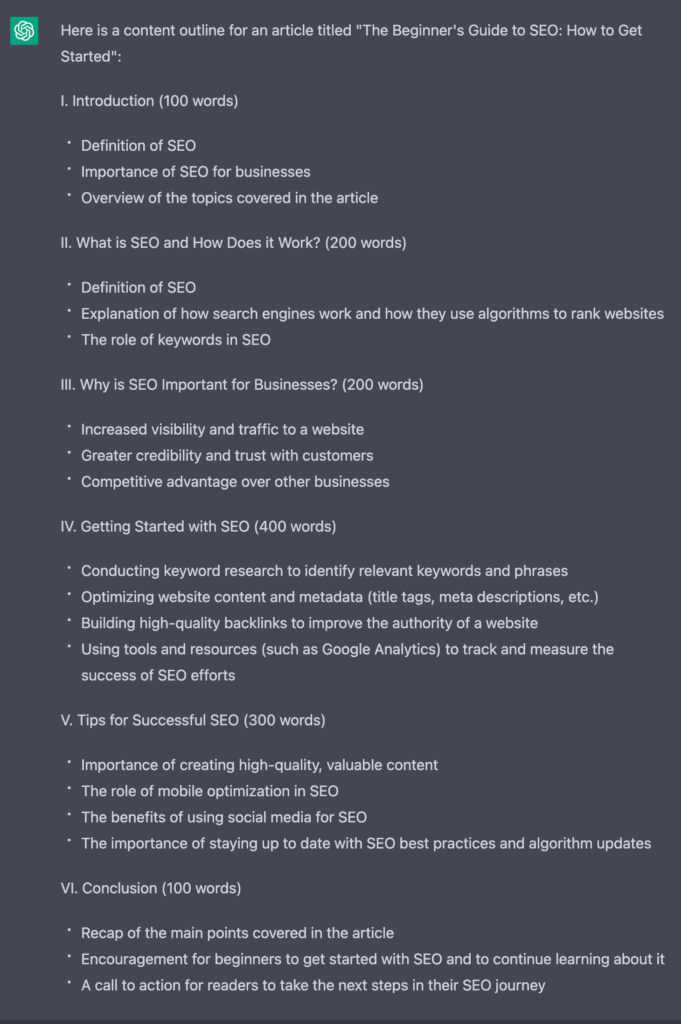
The word count and topic focus would still need to be validated with other SEO tools to ensure it is on par with the top ranked pages.
Closing Thoughts
ChatGPT needs data and a lot of it. As impressive as ChatGPT’s responses might be, they are no more than the outcome of algorithms processing large amounts of our language and data. That means there will still need to be subject matter experts creating in-depth insight. Our team of marketing psychologists at Market MindShift are experts in using AI for SEO strategies. Through our AI content writing services, we will help you draft content that taps into the psychological triggers that motivate human behavior to drive revenue.